
21 minute read
Faculty Accomplishments
Sarah Anderson
Branka Arsić
Zahid R. Chaudhary
Sarah Chihaya Sarah M. Anderson
My essay, “Stu dies in Medieval Star-Gazing,” was published as an invited essay for a special issue of the journal Arthuriana on the subject of “assembly.” The paper considers human acts of looking at the stars (or at what were thought to be stars) as aligned with richly generative practices of naming, translation, wordplay and cosmological speculation, as well as with cultural practices. The problem of the star and of the constellation is exposed through ancient works of both aesthetic and practical value, drawing examples from Cicero’s Aratea, the “Bayeux Tapestry” and select works of Geoffrey Chaucer (especially his “Boece,” “The House of Fame,” “A Treatise on the Astrolabe” and the prologue and tale of “The Wife of Bath”).
In February, I led an interactive workshop in the Princeton University Art Museum (PUAM) series, titled “A Long Look at Love: ‘Venus and Amor’ by Lucas Cranach the Elder.” In this workshop, I exposed an extraordinary series of subjects in Cranach’s complex mythographic portrait (1518-1520), one of the most imposing and challenging gems held by the PUAM.
Branka Arsić
Visiting Professor and Class of 1932 Fellow in the Council of the Humanities and the Department of English
In August 2021, I published a collected edition called “Dispersion, Thoreau and Vegetal Thought.” Grounded in Thoreau’s ecology and in contemporary plant studies, this volume ponders questions of how plants, despite their seeming stillness, can inform our ecological thought, ethics and politics through their methods of life and connection.
This fall, I am teaching a graduate seminar on literary and cultural theory, which explores how 19th-century (mostly) American authors registered the transformation of natural history into the sciences of life, and how attentiveness to the ecological fashioned their ethics. Most of our authors adopted a vitalist and materialist understanding of life, which led them to understand the boundaries of individual phenomena as porous and environmental. Changing their understanding of what the natural is, they proposed a series of cosmological, poetic and ethical responses to the idea that life is common to all creatures and in fact to all phenomena, and that matter is inherently dynamic and vitalized.
Zahid Chaudhary
I received a contract from Fordham University Press for my forthcoming book, “Unruly Truth: Libidinal Politics and Crises of Authority.” The book is a psychoanalytic account of post-truth politics, populism and mass paranoia in the United States and Europe. Examining how truth can function as a conduit into relations of power and authority, the book takes up contemporary conspiracy cultures, the recent emergence of whistleblowing as a form of political participation, online anonymity, and the appearance of strange new bodily symptoms that seem to index mass psychological maladies. Guided by Hannah Arendt’s ordering of truth and falsehood, I point to enduring hostility between truth and politics. This conflict means that “reading” lies forms a necessary part of humanistic study.
Sarah A. Chihaya
I recently published a review of Mieko Kawakami’s “Breasts and Eggs” in the New York Review of Books, where I was also the subject of a short profile. In July, I became a senior editor at the Los Angeles Review of Books (LARB), which is currently celebrating its 10th anniversary. To mark the occasion, LARB is hosting a series of public roundtables this fall that may be of interest to friends of the department. The series, titled “The Semipublic Intellectual Sessions,” will feature Princeton English alumni K. Austin Collins and Jesse McCarthy,
Simon Gikandi
Monica Huerta
—Zahid Chaudhary, “Humanities and Mobility” conference, Princeton Humanities Council among many other leading voices in literary criticism.
“Rather than focusing on the lessons that literature can offer readers about being more empathetic and expansively human, ‘Bibliophobia’ considers how seemingly negative, uncritical reactions provoked by texts, like bouts of melancholy or introspection, can actually generate the most vital readings.”
Hortense Spillers, Colleen Lye, Audra Simpson, Mladen Dolar, Alenka Zupančič and several others, and now I’m co-editing a collection of “commentaries” for PMLA (May 2022) for the 40th birthday of Fredric Jameson’s groundbreaking book “The Political Unconscious,” with papers by Neferti Tadiar, Maria Elisa Cevasco, Yogita Goyal, Jonathan Culler and others — with a response by Jameson.
—Sarah A. Chihaya on her book in progress, “Bibliophobia,” New York Review of Books
Andrew Cole
Currently, I’m finishing up two books, while the German translation of my last book, “The Birth of Theory,” enters its final stages. I’ve recently guest edited a volume of South Atlantic Quarterly called “The Ideology Issue” (October 2020), containing new essays by PMLA. Published work during this period include book chapters on “Africa and the Caribbean —Recrossing the Atlantic” in “Caribbean Literature in Transition, 1920-1970,” edited by Raphael Dalleo and Curdella Forbes; “Imagining Capitalism: Ngugi, Marx, Freud” in “Ngugi in the American Imperium,” edited by Timothy J. Reiss; and “African” in “How Literatures Begin: A Global History,” edited by Joel B. Lande and Denis Feeney. With the help of Zoom, I presented papers on “Primitivism and U.S.” at Johns Hopkins University; “Aesthetics and Domination” at the University of Hildesheim, Germany; “Literature and Utopian Thinking” at Universiti Putra Malaysia; “On Aesthetic Reparations” at the Research Center for Material Culture, Amsterdam; and on “Translation and the Work of the ‘Untutored’ Intellectuals” at Rutgers University.
Simon Gikandi
In addition to chairing the Department of English at Princeton, I continued to provide service to national humanities organizations, chairing the search committee for a new editor of the PMLA and participating in lobbying efforts to continue robust funding for the National Endowment for the Humanities. My address as president of the MLA was published in the October (2020) issue of the
QAnon and related conspiracies are forms of political participation to be taken seriously rather than dismissed, Prof. Chauhary argues in his new book.
Monica Huerta
My book, “Magical Habits,” was published in August 2021 in Duke University’s Writing Matters! series. This project draws on my experiences growing up in my family’s Mexican restaurants and my life as a scholar of literature and culture to meditate on how relationships among self, place, race and storytelling contend with both the afterlife of history and racial capitalism. The New York Times called it a “striking debut.”
I was also elected to the MLA Media Studies Visual Culture Forum executive committee.
Claudia Johnson
Josh Kotin
Russ Leo
“What I try to reencounter in these images are the linked and unstable channels of geography and time. My hope in doing so is to peer beyond the historical ontologies to which many of our historical narratives aspire—with print culture, as with many other archives. I want to find something, maybe, more humble: a space for thick, open, accounting as a critical process of divestment as itself a kind of historical relation, seeking out precisely those relations that productively undo us in order to open out to otherwise. Otherwise than the here and now to which these images brought us.”
—Monica Huerta, “Hold Still: Coming Undone Reading Print Culture Like a Work of Art,” forthcoming.
Claudia L. Johnson
I published my book, co-written with Clara Tuite, “30 Great Myths About Jane Austen” in 2020. I was also able to give several Zoom talks and lectures on Austen and an interview with The New York Times on Austen’s family and the slave trade.
–Claudia L. Johnson, NY Times Interview
Joshua I. Kotin
Under my directorship, the Shakespeare and Company Project was released in May 2020. Our work aims to recreate the world of the Lost Generation in interwar Paris through the study of the records of Sylvia Beach’s lending library. We have five researchers interning this summer ” — three undergrads, one grad student, and one student from the Prison Teaching Initiative.
I published a few essays, most significantly: “Poems That Kill” in Critical Inquiry (April 2021), examining the connection between poetry and revolution in Amiri Baraka’s “Black Art” (1965) and in general. I also co-edited three recently discovered letters from James Joyce to T.S. Eliot, which Eliot had enclosed in his correspondence to Emily Hale.
Irene Small and I co-taught a class on concrete and visual poetry last fall through the Departments of English and Art and Archaeology, and the Humanities Council. We got some nice press about it — and it was a great class.
Packages of rare books and ephemera sent to students for “Language to Be Looked At” during the pandemic. “Throughout the course, students were asked to consider how a mix of language and visual imagery simultaneously invites reading and looking. The work ‘Dear Reader. Don’t Read’ by conceptual artist Ulises Carríon highlights this tension expertly. According to Small, “In order to interact with this work you have to both obey it and disobey it.” Citing a specific course reading in Portuguese, Kotin found the potential challenge to literal understanding a fruitful one in considering this question: students could ‘without knowing the language, really see how words built upon each other. Lack of familiarity with the language helped us to talk about its fundaments.’”
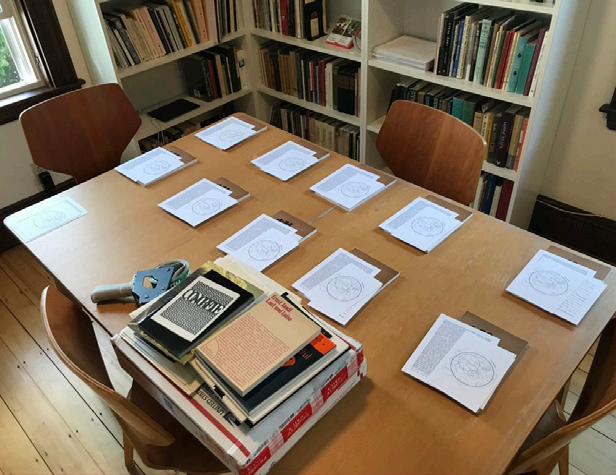
—Joshua Kotin, “Concrete Poetry in the Digital Classroom,” Princeton Humanities Council Newsletter
Russ Leo
I just completed an English translation and critical introduction of the preface to Baruch Spinoza’s “Opera Posthuma,” written in Dutch by his close friend Jarig Jellesz and translated into Latin
Christina León
Rhodri Lewis
Meredith Martin
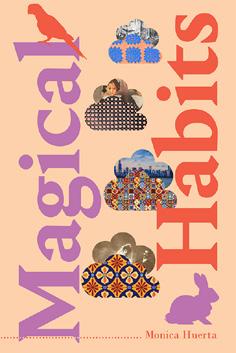
The New York Times called Monica
Huerta’s new book a “striking debut.” by another close friend, Lodewijk Meyer. It is a rare 17th-century introduction to Spinoza’s life and work that influenced generations of readers that will appear in the forthcoming “Collected Works of Spinoza, Volume III” (Princeton University Press). Moreover, I contributed annotations on early modern Dutch art, literature and religion to a new French edition of Spinoza’s “Éthique,” edited by Maxime Rovère, forthcoming from Flammarion. I am currently working on two substantial sections of a new book: one on John Locke; Louis Armond, Baron de Lahontan; and Joseph-François Lafitau and the foundational terms of political economy; and another on how Quakers (William Penn, George Keith and Benjamin Furly, among others) and Collegiants in Amsterdam and Rotterdam, Netherlands (particularly Joachim Oudaen, Jellesz, Jan Rieuwertsz, Pieter Balling and Johannes Bredenburg) cross-pollinate to reimagine institutions of kinship and exchange. I also started a new book on antipsychiatry and neoliberalism, so I’ve been writing on Antonin Artaud, R.D. Laing, Thomas Szasz, and L. Ron Hubbard’s early articulations of Dianetics.
Christina León
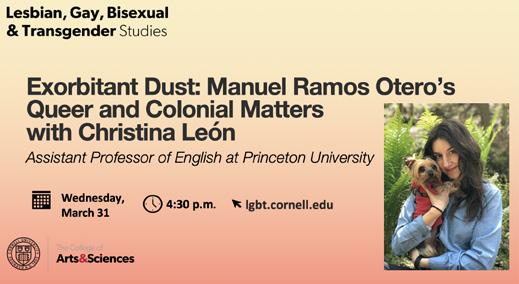
In June 2021, I published an article, “Exorbitant Dust: Manuel Ramos Otero’s Queer and Colonial Matters,” in the journal GLQ’s special issue on “Cuir/Queer Américas: Translation, Decoloniality and the Incommensurable.” The article is from my forthcoming manuscript, under contract with New York University Press.
I also gave invited talks on curiosity and pedagogy at Georgetown, Cornell, and American Universities.
“To read dust as both material and tropological brings one to the work of matter- metaphors, showing how matter figures our poetic vision and how poetic vision may impact our material pursuits. In the ethico- political landscape of Ramos Otero’s literary works, dust acts as a guiding matter- metaphor that draws our attention to how finitude is materially felt particularly at the crossroads of queerness and coloniality. The cross- contamination of matter and metaphor allows us to consider this enduring precarity at the level of the aesthetics, which is to say the senses and the body.”
— Christina León, From GLQ essay, “Exorbitant Dust.
Rhodri Lewis
I have continued to plug away at my book on Shakespearean tragedy, and I completed a piece about language and civility in the 1670s and 80s for a Festschrift to mark the 70th birthday of Mordechai Feingold. I have also published a couple of book reviews: one of Nicholas McDowell’s excellent new biography of John Milton (for Prospect magazine), and one of Margreta de Grazia’s “Four Shakespearean Period Pieces” (for the Los Angeles Review of Books). I signed a contract to write a critical-intellectual life of Frank Kermode, whose extensive papers are housed in the Firestone Library. Hopefully, this project will give me a reason to be done with tragedy, etc., as speedily as possible, beyond its intrinsic interest.
Meredith Martin
Under my directorship, the Princeton Prosody Archive accomplished a major milestone this summer: integrating sources from both HathiTrust Digital Library and Eighteenth Century Collections Online (ECCO) into its full-text searchable interface. You can follow the project on Twitter @prosodyarchive.
I have work forthcoming (2022) in the new volume of Debates in the Digital Humanities series at the University of Minnesota (“The Digital Futures of Graduate Study in the Humanities”), and the edited volumes “The Bloomsbury Handbook of Corpus Linguistics,” “The Cambridge Companion to the Poem” and “The Sound of Writing. ” I published “Prosody and Metre: Twentieth Century” in the “Oxford Bibliographies in British and Irish Literature,” as well as “Prosody” in the “Oxford
Paul Nadal
Rebecca E. Rainof
Robbie J. Richardson
Encyclopedia of Literary Theory,” in addition to two widely circulated essays, “The Poetry of the Future” and “The Poetry of the Past” that I co-authored with Virginia Jackson in Avidly, a section of the Los Angeles Review of Books about poetry and popular culture.
Paul Nadal
My essay, “Cold War Remittance Economy: U.S. Creative Writing and the Importation of New Criticism in the Philippines,” will be published next month in the September issue of American Quarterly, the official journal of the American Studies Association, as part of its special issue on “Language, Multilingualism and Translation in American Studies.” Drawing on archival sources, the essay casts new light on translation’s economic meaning as transfer or exchange by examining the impact of America’s massive foreign-direct investments in Philippine literary culture during the early Cold War.
N. V. M. Gonzalez (1915–1999) is one of the most important writers in Philippine and Filipino American literature. In his early career, like many writers of the postwar generation, Gonzalez was underwritten by decades-long financial support from the Rockefeller Foundation. “Into this Cold War remittance economy, where thousands of dollars flowed daily from New York City to Iowa City to Stanford to Manila — dollars that also funded Wallace Stegner’s lectures in the Philippines in 1951 and William Faulkner’s in 1955 — the Rockefeller Foundation’s foreign direct investment in Philippine literature all but guaranteed the persistence of English proficiency as a measure of the Philippines’ so-called export-ready human capital. During the first decades of independence, philanthropic and state money helped materialize the conditions for the enduring economic significance of overseas Filipinos by having financed the massive expansion of Englishlanguage education, including creative writing workshops and the hands-on training of writers in the craft-focused modes of U.S. creative writing.”
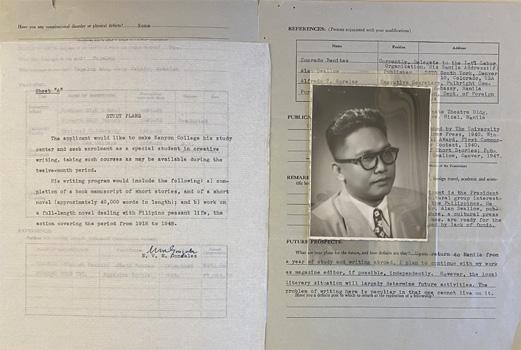
— Paul Nadal
Rebecca E. Rainof
I published an essay titled “Mixed Feelings” in Literary Imagination (July 2021) in response to Cathy Park Hong’s “Minor Feelings.” My essay reflects upon the experience of reading Hong’s book as a mixed-race scholar, and feelings of belonging and nearness in contrast with feelings of exclusion and alienation.
“I find ‘speaking nearby’ appealing as a model for relating to culture. Nearby can be intimate, a loved one pressed to your side. It can be removed, a detached observation or indifference realized once impinged on, unsettled. Nearby can be inside and outside at once, inclusion and exclusion, affiliation and alienation. Sometimes, nearby can mean misplacement or displacement, as when one is racially misidentified or nudged out of a category. Nearby can also be far away, the feeling I have when looking at black and white photographs of Heart Mountain prison camp, a site of Japanese American incarceration during WWII, its barrack rows receding to a distant vanishing point. I imagine my mother a squalling newborn in this place beyond her recollection.”
—Rebecca E. Rainof, “Mixed Feelings,” in Literary Imagination
Robbie J. Richardson
I’ve finally relocated from London to Princeton, New Jersey, after my first year, during which I taught from the United Kingdom. I’m grateful to be around this beautiful campus, and I look forward to connecting more directly with local Indigenous history and intellectual traditions. I invited an undergraduate student from my class “Topics in 18th-century Literature: North American ‘Indians’ in Transatlantic Contexts” to write alongside me for a piece in the Los Angeles Review of Books on Antiracism in the Contemporary University. We both wrote on decolonizing the university from an Indigenous perspective, and I helped her edit and shape before submission. The student, Keely Toledo, is co-president of Natives at Princeton.
“The last few years have witnessed a rise in interest toward Indigenous peoples in North American academia and beyond. Much of this has been fueled by the attempt to ‘decolonize’ curriculums and institutions. ...Yet it has also led to a liberal appropriation of such struggles — which does not benefit the people to whom decolonization is ostensibly addressed — and, at times, a shallow focus on positionality rather than material conditions. Life for Native people under settler colonialism continues to be one of ‘structured dispossession.’”
—Robbie J. Richardson in LARB.
Sarah Rivett
Evie Shockley
Nigel Smith
D. Vance Smith Sarah Rivett
I received a 250th Anniversary Fund for Innovation in Undergraduate Education grant for “Native American Literature,” which includes a service-learning component. We are taking a class trip to the Munsee Three Sisters Medicinal Farm in northern New Jersey to learn about food sovereignty, environmental justice, and Lenape history and storytelling. I published an essay, “The Raven and the Bobolink,” in the EAL Journal over the summer, co-authored with Chi-ming Yang. We did a podcast, 56.2 Podcast, to accompany the article, which is available on Spotify and Soundcloud. I was also featured on Ulrich Baer’s (New York University) podcast called “Think About It,” on which we talked about the American literary canon.
Evie Shockley
Bain-Swiggett Visiting Professor of Poetry & Poetics I am editing Harriet Jacobs’ “Incidents in the Life of a Slave Girl. Written by Herself” for the new Norton Library, and I will be working on the introduction this fall. The volume is scheduled for publication in 2022.
Nigel Smith
In March I gave a talk, “Milton and Community,” at the 30th Anniversary Meeting of the British Milton Seminar — I gave the first paper at the Seminar’s first meeting 30 years ago in Birmingham, United Kingdom, as a callow 32-year-old. In May, I had the pleasure of giving the final plenary lecture at the eighth annual English Colloquium, ‘Reimagining Andrew Marvell: The Poet at 400’, held at the University of St Andrews, Scotland. My article, “Transnational Literary Exchange in the Early Modern Low Countries,” which was jointly edited and published with Jan Bloemendal and James A. Parente, appeared in a groundbreaking issue of Renaissance Studies.
Next year, I will be the Marta Sutton Weeks External Fellow at the Stanford Humanities Center. During this leave fellowship, I will write a new book on “Literature Crossing Ethnic and Racial Boundaries, 1600-1700.” The book will examine the early modern European understanding of their world as multilateral: multicultural, multiethnic, formed by the coming together of different elements from distant places and even different continents.
Dipartimento di Filosofia e Beni Culturali
photo:Lorenza Fontana
Giovedì 24 giugno 2021
ore 16:00 - 18:00
Zoom Meeting Details:
unive.zoom.us/j/4847172446
Meeting ID: 484 717 2446
Organizer: Jonathan Regier Ca’ Foscari University of Venice
This seminar takes place in the framework of a project that has received funding from the European Union’s Horizon 2020 research and innovation programme under grant agreement No 893982. Agudeza, The Axe’s Edge: Early Modern Poetry and International Politics
Nigel Smith
Princeton University
Vance Smith
Following the publication of my book, “Arts of Dying,” from the University of Chicago Press, I’m currently finishing up a book on Africa, colonial racism, and the Middle Ages. An excerpt from it was published in the magazine Aeon this past June.
I’m curating a show of Trenton, New Jersey, artists, Arts in the Invisible City, at the Slought Gallery in Philadelphia. Based on a seminar supported by the English department, the Humanities Council, the Lewis Center for the Arts, and the Program in Urban Studies, it will run from Sept. 30-Nov. 30.
I moved to Trenton four years ago in the wake of the 2016 election. It’s a city utterly unlike Princeton, New Jersey, poor and with an 88% population of people of color. Many of the service workers at Princeton — but almost none of the faculty — live in Trenton, yet one rarely hears about Trenton around campus. With the support of the English department and other University units, I began a seminar called “Arts in the Invisible City” that allows Princeton undergraduates to learn, from community activists and artists in Trenton, something about what artistic and community engagement is like in a place without the vast resources and the profile of Princeton. To its credit, the University is finally thinking about ways to interact meaningfully with Trenton. A lot of my extra academic work now involves coalitions of artists, activists, community organizers and Princeton stakeholders.
“The trick for intellectuals is to imagine continually what’s actually obscured by what we read: the languages of people who don’t read Antonio Gramsci, or Paulo Freire, or Fred Moten. Darren Green, an extraordinary activist in Trenton, New Jersey, walks around 11 public housing projects every day, several of them more than once, to talk with, and listen to, the people who live in them. He likes to say that the elderly are like walking bookshelves. As the example of [Pierre] Bourdieu shows, even the most intellectually committed, even the
Susan J. Wolfson
Autumn M. Womack
smartest –– perhaps especially the smartest –– of us can all too easily overlook the script of those lives, the language that might remain hidden for too long.”
—Vance Smith, “Africa Writes Back,” Aeon
Susan J. Wolfson
During the academic year 2020-2021, my sabbatical was happily complemented by my appointment to an Old Dominion Research Professor and Faculty Fellow in the Council of the Humanities. In addition to participating in the lively weekly seminars, I mentored a few of the Post Docs, and gave two talks...one on the book project, “Romanticism’s Generative Readings,” that secured this appointment, and a well-attended public lecture on the darker shades in the light bright sparkling of Jane Austen’s “Pride and Prejudice.” Covid Crisis notwithstanding, the necessary homeboundness proved pleasingly productive. I completed several essays, some forthcoming, and some seeing print. My major project was completing “A Greeting of the Spirit,” 80 essays, of varying lengths on poems and passages by Keats. It’s in production at Harvard University Press, due out next fall. All this has added new energy and excitement to my return to classroom teaching and thesis advising.
Autumn M. Womack
This year I completed my first book, “The Matter of Black Living: The Aesthetic Experiment of Racial Data, 1880-1930,” which is scheduled for publication by the University of Chicago Press in October 2021. I was excited to see a few new essays in print, including a piece of W.E.B. Du Bois’ unpublished novel “Scorn” that appeared in the edited volume “Apocalypse in America and Reprinting the Past/ Reordering Black Social Life” in the winter issue of American Literary History. I also spent quite a bit of time working on a new edition of Charles Chesnutt’s 1901 novel “The Marrow of Tradition” for Norton’s new paperback series the Norton Library, which was a fun and new kind of writing project. Beyond this kind of research, I was thrilled to be the recipient of funding to revise two of my fall 2020 courses to meet the demands of remote teaching.
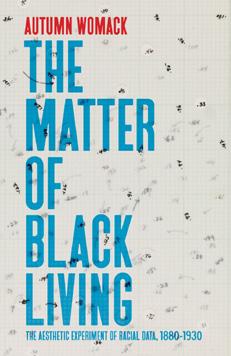

Gene Andrew Jarrett / Dean of the Faculty
Gene Andrew Jarrett began his appointment as Dean of the Faculty and as William S. Tod Professor of English at Princeton University on August 1, 2021. He earned his AB in English from Princeton University and his AM and PhD in English from Brown University.
Before Dean Jarrett’s current role at Princeton, he was Seryl Kushner Dean of the College of Arts and Science and Professor of English at New York University. Prior to that, he worked at Boston University, where he was a professor jointly appointed in the Department of English and the Program in African American Studies; he also served as Chair of the English Department and Associate Dean of the Faculty for the Humanities. Before Boston University, he began his academic career as an Assistant Professor of English at the University of Maryland, College Park. In Spring 2021, Dean Jarrett was appointed to the Association of American Universities’ Advisory Board for Racial Equity in Higher Education, which seeks to address issues of racial inequity on campus and examine structural barriers to academic access and success in higher education.





